Rather than send troops in response to the coup, France and the U.S. seem to favor a “Rwanda” type solution applied in Mozambique, writes Vijay Prashad. Only this time ECOWAS would apply force.
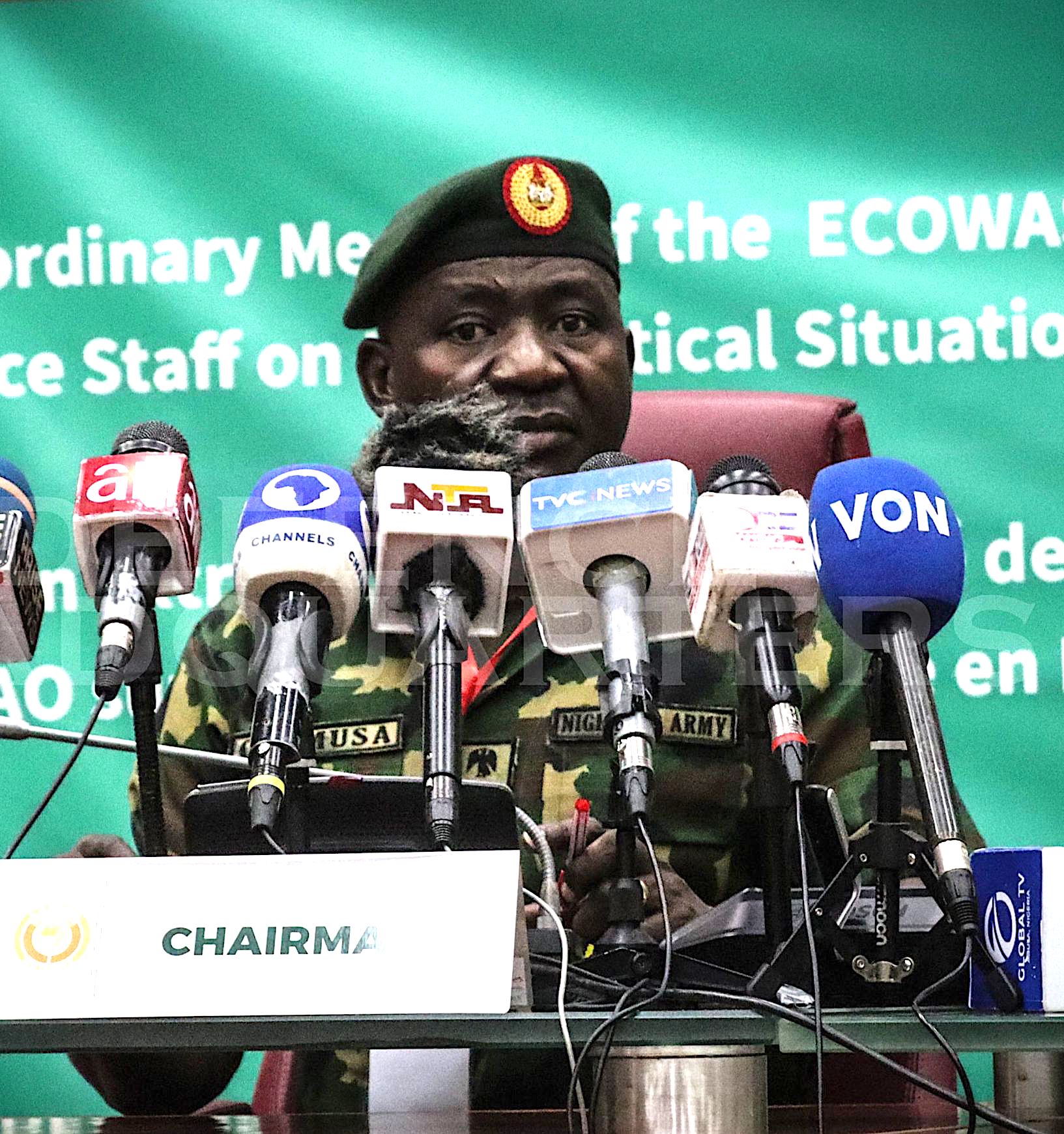
Nigerian Major General Christopher Gwabin Musa at the extraordinary meeting of the ECOWAS chiefs of defence staff on Aug. 3. (Nigerian Defence Headquarters, Wikimedia Commons, CC BY-SA 4.0)
By Vijay Prashad
Peoples Dispatch
 On July 26, Niger’s presidential guard moved against the sitting president — Mohamed Bazoum — and conducted a coup d’état.
On July 26, Niger’s presidential guard moved against the sitting president — Mohamed Bazoum — and conducted a coup d’état.
A brief contest among the various armed forces in the country ended with all the branches agreeing to the removal of Bazoum and the creation of a military junta led by Presidential Guard Commander General Abdourahamane “Omar” Tchiani.
This is the fourth country in the Sahel region of Africa to have experienced a coup — the other three being Burkina Faso, Guinea and Mali. The new government announced that it would stop allowing France to leech Niger’s uranium (1-in-3 lightbulbs in France is powered by the uranium from the field in Arlit, northern Niger).
Tchiani’s government revoked all military cooperation with France, which means that the 1,500 French troops will need to start packing their bags (as they did in both Burkina Faso and Mali).
Meanwhile, there has been no public statement about Airbase 201, the U.S. facility in Agadez, a thousand kilometers from the country’s capital of Niamey. This is the largest drone base in the world and key to U.S. operations across the Sahel. U.S. troops have been told to remain on the base for now and drone flights have been suspended. The coup is certainly against the French presence in Niger, but this anti-French sentiment has not enveloped the U.S. military footprint in the country.
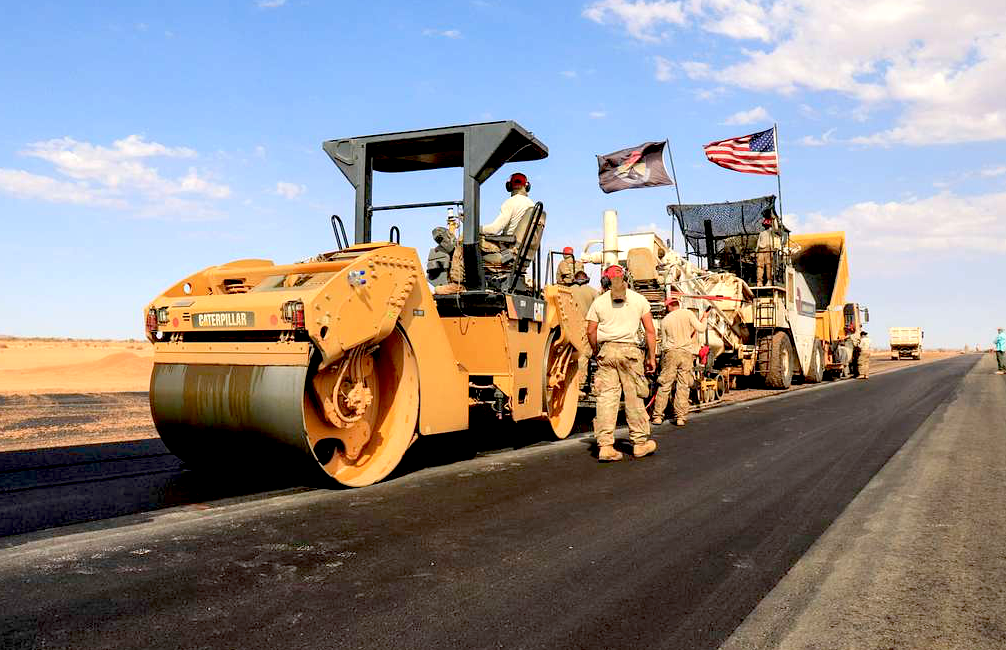
U.S. soldiers paving a flight line on Nigerien Air Base 201, Dec. 15, 2018. (U.S. Air Force, Daniel Asselta)
Interventions
Hours after the coup was stabilized, the main Western states — especially France and the United States — condemned the coup and asked for the reinstatement of Bazoum, who was immediately detained by the new government.
But neither France nor the United States appeared to want to lead the response to the coup. In 2021, the French and U.S. governments worried about an insurgency in northern Mozambique that impacted the assets of the Total-Exxon natural gas field off the coastline of Cabo Delgado.
Rather than send in French and U.S. troops, which would have polarized the population and increased anti-Western sentiment, the French and the United States made a deal for Rwanda to send its troops into Mozambique. Rwandan troops entered the northern province of Mozambique and shut down the insurgency.
Both Western powers seem to favor a “Rwanda” type solution to the coup in Niger, but rather than have Rwanda enter Niger the hope was for ECOWAS — the Economic Community of West African States — to send in its force to restore Bazoum.
A day after the coup, ECOWAS condemned the coup. ECOWAS encompasses 15 West African states, which in the past few years has suspended Burkina Faso and Mali from their ranks because of the coups in that country; Niger was also suspended from ECOWAS a few days after the coup.
Formed in 1975 as an economic bloc, the grouping decided — despite no mandate in its original mission — to send in peacekeeping forces in 1990 into the heart of the Liberian Civil War.
Since then, ECOWAS has sent its peacekeeping troops to several countries in the region, including Sierra Leone and Gambia.
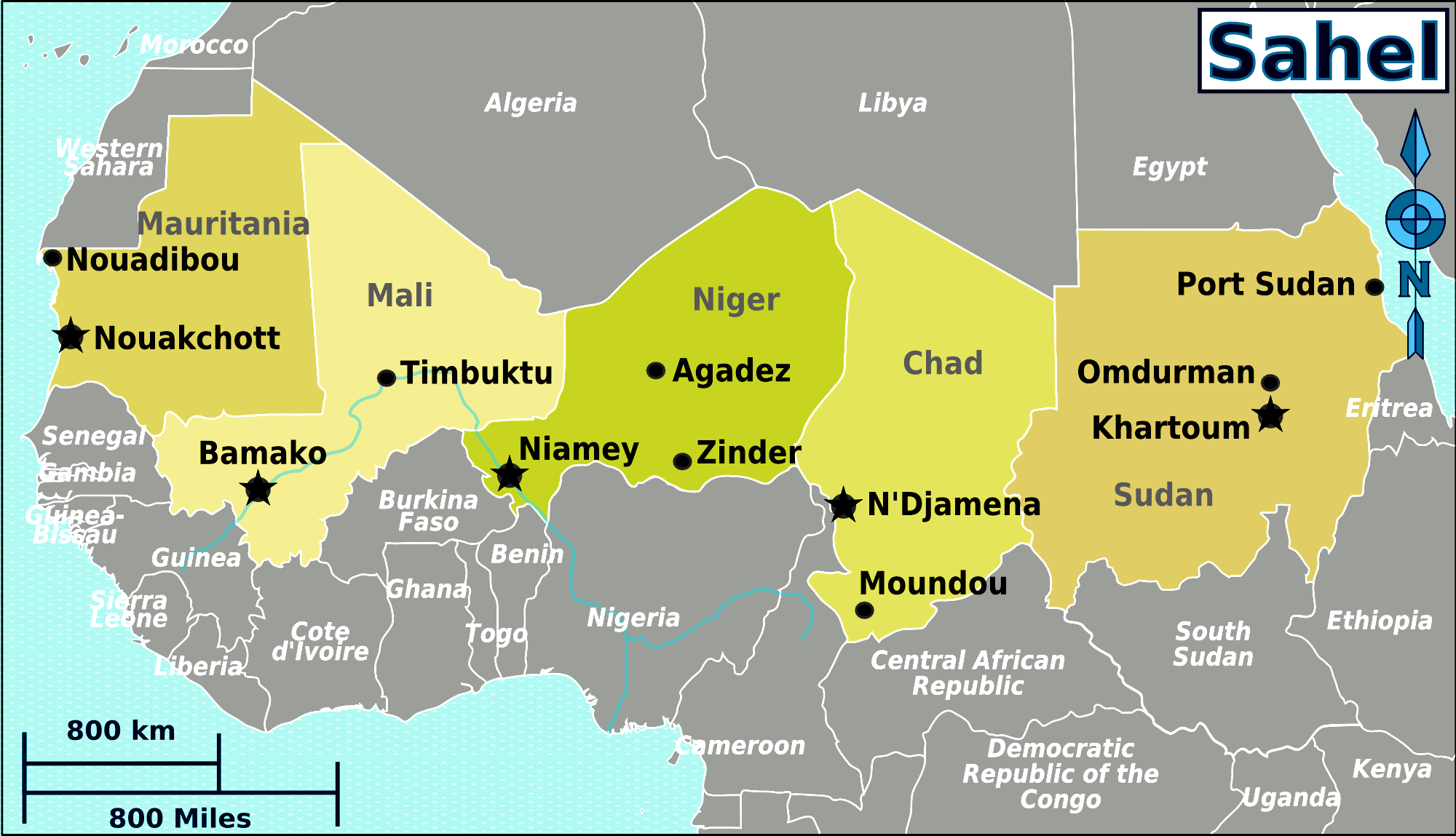
(CC BY-SA 3.0, Wikimedia Commons)
Not long after the coup in Niger, ECOWAS placed an embargo on the country that included suspending its right to basic commercial transactions with its neighbors, freezing Niger’s central bank assets that are held in regional banks, and stopping foreign aid (which comprises forty percent of Niger’s budget).
The most striking statement was that ECOWAS would take “all measures necessary to restore constitutional order.”
An Aug. 6 deadline given by ECOWAS expired because the bloc could not agree to send troops across the border.
ECOWAS asked for a “standby force” to be assembled and ready to invade Niger. Then, ECOWAS said it would meet on Aug. 12 in Accra, Ghana, to go over its options. That meeting was canceled for “technical reasons.”
Mass demonstrations in key ECOWAS countries — such as Nigeria and Senegal — against an ECOWAS military invasion of Niger have confounded their own politicians to support an intervention. It would be naïve to suggest that no intervention is possible. Events are moving very fast, and there is no reason to suspect that ECOWAS will not intervene before August ends.
Coups in the Sahel
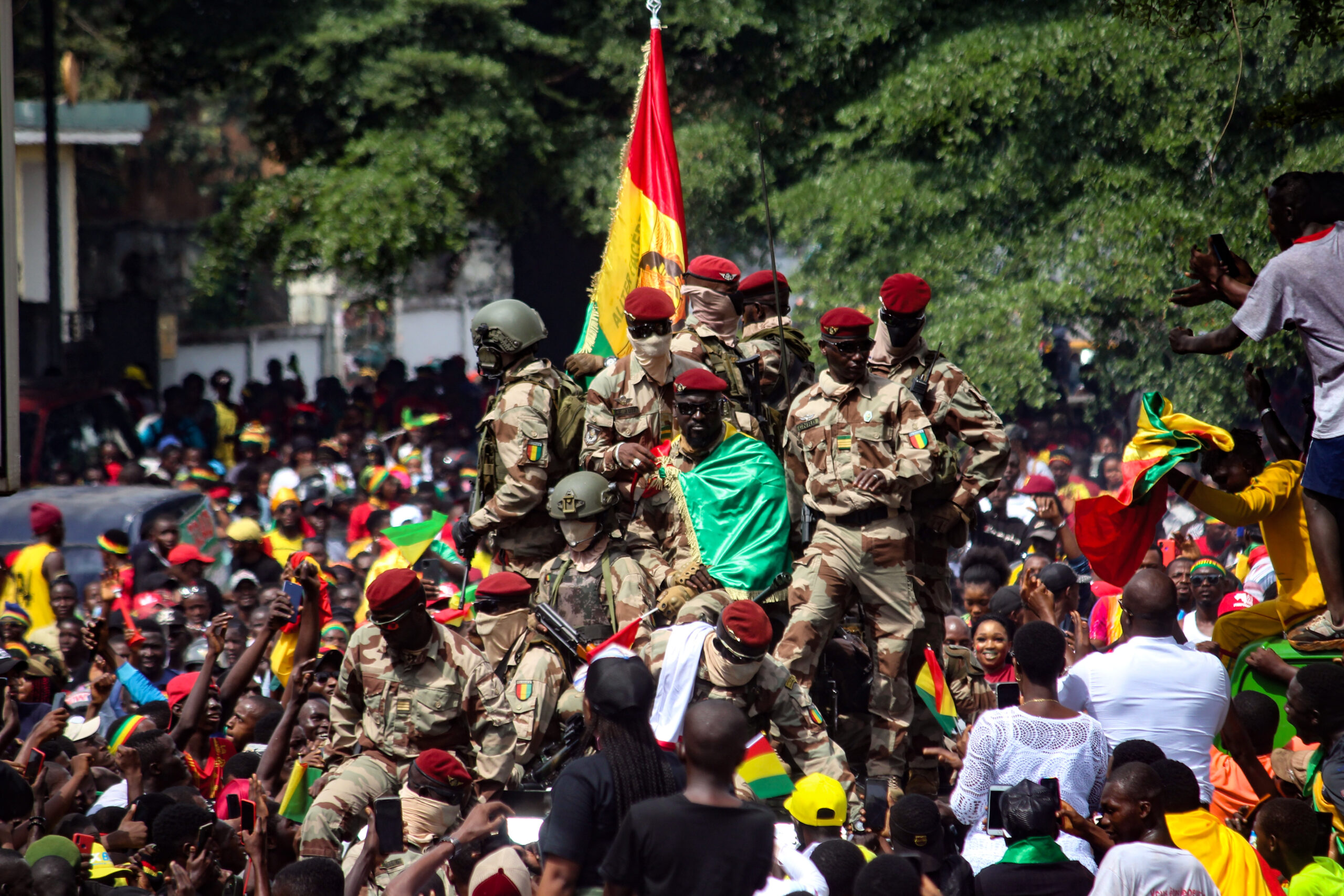
Guinea’s Mamady Doumbouya on Oct. 2, 2021. (Aboubacarkhoraa, Wikimedia Commons, CC BY-SA 4.0)
When ECOWAS suggested the possibility of an intervention into Niger, the military governments in Burkina Faso and Mali said that this would be a “declaration of war” not only against Niger but also against their countries.
On Aug. 2, one of the key leaders of the Niger coup, General Salifou Mody traveled to Bamako, Mali, and Ouagadougou, Burkina Faso, to discuss the situation in the region and to coordinate their response to the possibility of an ECOWAS — or Western — military intervention into Niger.
Ten days later, General Moussa Salaou Barmou went to Conakry, Guinea, to seek that country’s support for Niger from the leader of the military government in that country, Mamadi Doumbouya.
Suggestions have already been floated for Niger — one of the most important countries in the Sahel — to form part of a federation that will include Burkina Faso, Guinea and Mali. This would be a federation of countries that have had coups to overthrow what have been seen to be pro-Western governments that have not met the expectations of increasingly impoverished populations.
 The story of the coup in Niger becomes partly the story of what the communist journalist Ruth First called “the contagion of the coup” in her remarkable book, The Barrel of the Gun: Political Power in Africa and the Coup d’états(1970).
The story of the coup in Niger becomes partly the story of what the communist journalist Ruth First called “the contagion of the coup” in her remarkable book, The Barrel of the Gun: Political Power in Africa and the Coup d’états(1970).
Over the course of the past 30 years, politics in the Sahel countries has seriously desiccated. Parties with a history in the national liberation movements, even the socialist movements (such as Bazoum’s party) have collapsed into being representatives of their elites, who are conduits of a Western agenda. The French-U.S.-NATO war in Libya in 2011 allowed jihadis groups to pour out of Libya and flock into southern Algeria and into the Sahel (almost half of Mali is held by Al-Qaeda-linked formations).
The entry of these forces gave the local elites and the West the justification to further tighten limited trade union freedoms and to excise the left from the ranks of the established political parties.
It is not as if the leaders of the mainline political parties are right-wing or center-right, but that whatever their orientation, they have no real independence from the will of Paris and Washington. They became — to use a word on the ground — “stooges” of the West.
Absent any reliable political instruments, the discarded rural and petty-bourgeois sections of the country turn to their children in the armed forces for leadership. People like Burkina Faso’s Captain Ibrahim Traoré (born 1988), who was raised in the rural province of Mouhoun, and Mali’s Colonel Assimi Goïta (born 1988), who comes from the cattle market town and military redoubt of Kati, represent these broad class fractions perfectly.
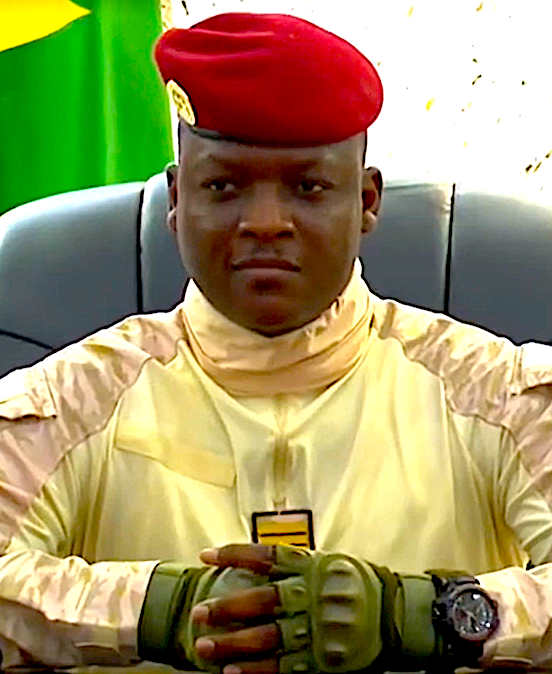
Burkina Faso’s Ibrahim Traoré during a meeting with the African Union in July. (Lamine Traoré / VOA, Wikimedia Commons, Public domain)
Their communities have been utterly left out by the hard austerity programs of the International Monetary Fund, the theft of their resources by Western multinationals and of the payments for Western military garrisons in the country. Discarded populations with no real political platform to speak for them, these communities have rallied behind their young men in the military.
These are “Colonel’s Coups” — coups by ordinary people who have no other options — not “General’s Coups” by the elites to stem the political advancement of the people.
That is why the coup in Niger is being defended in mass rallies from Niamey to the small, remote towns that border Libya.
When I traveled to these regions before the pandemic, it was clear that the anti-French sentiment found no channel of expression other than hope for a military coup that would bring in leaders such as Thomas Sankara of Burkina Faso, who had been assassinated in 1987.
Captain Traoré, in fact, sports a red beret like Sankara, speaks with Sankara’s left-wing frankness, and even mimics Sankara’s diction. It would be a mistake to see these men as from the left since they are moved by anger at the failure of the elites and of Western policy. They do not come to power with a well-worked out agenda built from left political traditions.
The Niger military leaders have formed a 21-person cabinet headed by Ali Mahaman Lamine Zeine, a civilian who had been a finance minister in a previous government and worked at the African Development Bank in Chad. Military leaders are prominent in the cabinet. Whether the appointment of this civilian-led cabinet will divide the ranks of ECOWAS is to be seen.
Certainly, Western imperialist forces — notably the United States with troops on the ground in Niger — would not like to see this torque of coups remain in place.
Europe — through French leadership — had shifted the borders of their continent from north of the Mediterranean Sea to south of the Sahara Desert, suborning the Sahel states into a project known as G-5 Sahel.
Now with anti-French governments in three of these states — Burkina Faso, Mali and Niger — and with the possibility of trouble in the two remaining states — Chad and Mauritania —Europe will have to retreat to its coastline. Sanctions to deplete the mass support of the new governments will increase, and the possibility of military intervention will hang over the region like a famished vulture.
[Correction: The date when the French and the United States made a deal for Rwanda to send its troops into Mozambique has been corrected to 2021, from “earlier this year.”]
Vijay Prashad is an Indian historian, editor and journalist. He is a writing fellow and chief correspondent at Globetrotter. He is an editor of LeftWord Books and the director of Tricontinental: Institute for Social Research. He is a senior non-resident fellow at Chongyang Institute for Financial Studies, Renmin University of China. He has written more than 20 books, including The Darker Nations and The Poorer Nations. His latest books are Struggle Makes Us Human: Learning from Movements for Socialism and, with Noam Chomsky, The Withdrawal: Iraq, Libya, Afghanistan and the Fragility of U.S. Power.
This article was produced by Globetrotter and published by Peoples Dispatch.
The views expressed are solely those of the author and may or may not reflect those of Consortium News.

Yes, as Andrew Thomas points, out, this article by Vijay Prashad fills in the blanks for those of us who wanted to know more about the countries bordering Niger – the ECOWAS group – that have been primed for decades, apparently, by America and France as their proxies in Africa and who, like Ukraine before them, could have been/could be dragged into war to defend our colonial theft of the natural resources of that region.
It seems to me that the cat is now out of the bag; the colonial powers have so discredited themselves with their punishing sanctions and hypocrisy that the rest of the world with certainty at their back is gaining speed to establish the institutions of the multi polar world.
A camaraderie of hope for a better more just world as they say….my hat’s off to them, especially since I see nothing in western leadership that gives me confidence in them to achieve a safe landing.
I also thank our whistleblowers including the most persecuted, Julian Assange, who lit up the sky on the banality (as Hannah Arendt opined) of the evil of this empire.
Interestingly, none other than the Director of the Russian Foreign Intelligence Service gave this surprising speech on the hegemony.
Sarcasm and all:
hxxps://www.youtube.com/watch?v=3Y9ZjFYg4S8
Sounds like ECOWAS will be analogous to the Contra Death Squads in Central America. America’s puppets will be well rewarded and the Western Africans will continue to suffer.
As long as Americans don’t have to send their children to war, the US military and Intelligence Agencies are free to do what they want.
ECOWAS: “School of the Africas.” What could be more natural in this age’s neocon infestation of plague proportions that once spawned the U.S.’s notorious “School of the Americas” for the western Southern Hemisphere?
Hire Wagner. The only thing the US respects is force and the US has no intention or capability to negotiate a settlement.
Chad is an instructive example: in 2021, the freshly elected president (in office since 1990, military rule for initial 6 years) got murdered, and rather than repeat the elections, generals headed by his son took power directly, with quick approval from the West, led by France. This shows that the West could not care less about democracy and development (hardly any observed in Chad).
The West cares about corruption in a very corrupt manner. Apart from material gifts, corruption involves banking activities which are monitored and collected as “kompromat”. Thus be them politicians or not elected strongmen, they have free reign as long as they are obedient. I guess that opposition can be “pre-corrupted”, my observation is in news from Ecuador about “indigenous activist and former prefect of Azuay Province, Yaku Pérez Guartambel [leader of] Pachakutik Plurinational Unity Movement – New Country (MUPP) [wiki]”.
“It would be a mistake to see these men as from the left since they are moved by anger at the failure of the elites and of Western policy.”
Perhaps. But it’s still a very darn good start for them to ascend to positions of influence by being moved by anger at the failure of the elites and of Western policy.
Thank you for this. You brought some context to your analysis that was extremely helpful in helping me to understand what is going on here.